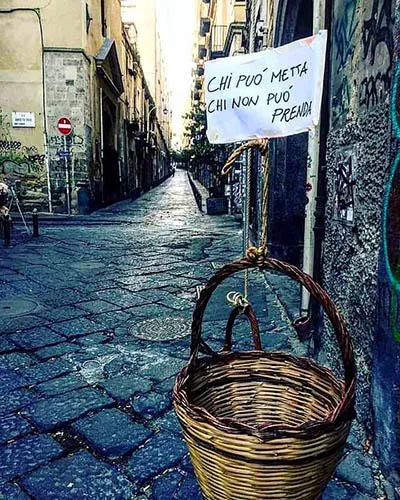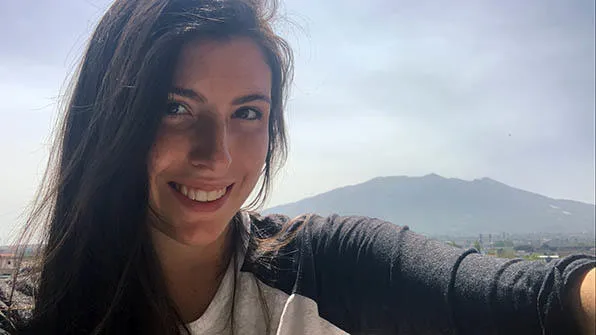Those who can give, may give. Those who cannot, may take.
A Neapolitan expression
06 May 2020
Alumni who are continuing to serve – Italy
Solidarity, empathy, and social distancing in Naples.

Chiara Caiazzo (Comparative Literature, 2019) shares her story from Naples. Read more #ContinuingToServe stories here.
April 9 2020
'The story I would like to share with King’s Alumni Community regards the reframing of solidarity and empathy during the Covid-19 pandemic.
My name is Chiara, and I graduated in Comparative Literature last summer. I am spending these troubled times in my hometown, a city in the province of Naples, Italy. As you all know, Italy was the first European country to be dramatically affected by the virus, and it still counts a huge amount of active cases and deaths. Giuseppe Conte, Italy’s Prime Minister, declared national lockdown on March 9. While the lockdown concerned the entire country, meaning that all non-essential workers had to work from home or stay home, measures varied slightly from region to region.
Vincenzo De Luca, President of the Campania region (where Naples is located), was among the leaders who decided to adopt the strictest measures from the very beginning. There is no food delivery option, police are on the streets and, in some cities, there are even drones to control the situation and make sure nobody is out to take a walk or other inessential reasons. As a result, the chaotic, crowded, noisy Naples I have always known, the one that I recall from my earliest childhood memories, is almost unrecognizable. I say almost because some of the things that characterize the city are still present: inventiveness, solidarity, and empathy. The inhabitants of Naples always find a way to help others, even in the most troubled times as the one we are all living right now. Not long after De Luca declared the strict regional measures and the exorbitant fares to pay in case of non-compliance, a traditional Neapolitan object, what we call ‘’o panáro’ (literally ‘the bread-basket’), took the scene in a slightly repurposed form.
The panaro is essentially a picnic basket which is usually employed to give food supplies – or anything, really – to one’s relatives or friends without leaving the house, in order to save time. I remember each time my aunt made a cake when I was a kid, instead of leaving the house, she used to put a piece in this panaro which slowly descended from her balcony to the street, where I was waiting. Now, the panaro does not need anyone to wait on the street under the balcony.

This picture shows an empty panaro in historical center of Naples, with a piece of paper saying ‘Those who can give, may give. Those who cannot, may take’. Then, passers-by can either fill the basket with food or other essentials, or they can take what others leave in the basket. It is a way to get everyone involved, nobody should feel abandoned or left alone in this situation.
The picture went viral and this sort of thing was done in almost every town in Campania, with some people starting to leave food supplies outside their door with the same message. It is a difficult time also from an economic standpoint, and for some people it is more difficult than others. In Naples, poverty is very widespread, with many homeless people, poor immigrants, people who lost their jobs because of the pandemic. Therefore, a small act of kindness like this can really make a difference. It proves that, even in times of social distancing, empathy and solidarity are still highly valued, and they can be enacted in many different ways.
I hope this story will inspire people to do the same. I wish to use this story to spread a message of solidarity. It doesn’t matter where you are. We are all in this together, we must resist together, without giving up the hope that this, too, will be overcome. In the meantime, we must not forget our sense of community, and the importance to think about what we can do to help those in need. It is a privilege to be at home with all the comforts, starting from food on the table and a roof on our head. It is not a fault, but it is fundamental that we use our privilege to give to others.
The world is not going to change on its own, it needs us and our actions, for how small they might be. If we want a better world after this pandemic ends, we must do something to bring this change and make it last.
Chiara Caiazzo (Comparative Literature, 2019)

Let’s take this time not only to rethink solidarity, but to actively enact it. The world is not going to change on its own, it needs us and our actions, for how small they might be. If we want a better world after this pandemic ends, we must do something to bring this change and make it last. Finally, as the Neapolitan actor, screenwriter and poet Eduardo De Filippo famously said, ‘adda passà ‘a nuttata’ (the night shall pass).'
Adda passà ‘a nuttata’(the night shall pass).
Eduardo De Filippo, Neapolitan actor, screenwriter and poet
This is just one of the many ways our alumni are #continuingtoserve their communities and make a difference. Help us celebrate these acts of kindness by sharing your story using the hashtags #ForeverKings and #ContinuingToServe.
Read more #ContinuingToServe stories here.
